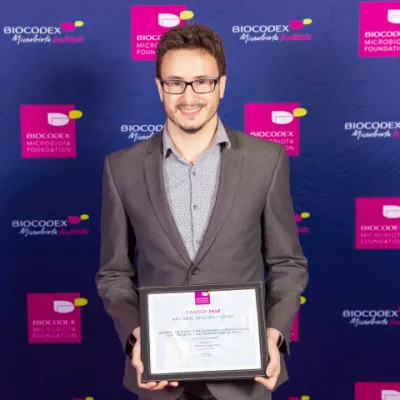
Project description
The use of certain immunosuppressive medications, such as those used in the setting of transplant and autoimmune disease, may increase the risk of metabolic syndrome by altering lipid or glucose metabolism and promoting weight gain. Metabolic syndrome is linked to both an altered gut bacterial composition and systemic inflammation in Inflammatory Bowel Disease (IBD). Solid organ transplant patients also develop metabolic syndrome, including post-transplant diabetes mellitus (PTDM), at a much higher rate than the general population despite a lack of systemic inflammation. The common link between these two patient populations is the use of immunosuppressive treatments. Despite metabolic syndrome being common in these patient populations with a consequent impact on lifespan, its scientific basis remains incompletely understood and has been poorly studied. We hypothesize that enteric dysbiosis in the context of immunosuppression contributes to metabolic disease.
News from Dr. Mamatha Bhat, MD PSc PhD FRCPC
Introduce yourself, your research project and your experience with the Microbiota Grant Research Program
(https://bhatlab.ca/)
I am a Hepatologist and Clinician-Scientist at UHN’s Ajmera Transplant Centre, and an Assistant Professor of Medicine at the University of Toronto, Canada. The goal of my research program is to improve long-term outcomes of liver transplantation through a precision medicine approach. Her program is unique in using tools of Artificial Intelligence with bioinformatics and molecular biology to personalize the care of liver transplant recipients based on an improved biological understanding of the liver and disease after transplant.
What inspired you to pursue this specific research project?
The improvement of short-term survival rates for liver transplant recipients over recent decades has not been paralleled by similar gains in long-term survival, primarily due to the onset of complications such as post-transplant diabetes, metabolic dysfunctionassociated steatotic liver disease (MASLD), and recurrent hepatocellular carcinoma, which markedly reduce life expectancy post-transplant. My research program focuses on these complications within the framework of precision medicine, looking at different possible contributors including intestinal microbiome, which may undergo significant changes due to immunosuppressive therapies. Although the adverse outcomes associated with these medications are recognized, the precise biological mechanisms—particularly those related to the alterations in the gut microbiota—that mediate the increased risk of metabolic post-transplant complications have not been adequately defined. This gap underscores the need for a more detailed understanding of how immunosuppressant- Biocodex Microbiota Foundation Grant BHAT MAMATHA 2 induced dysbiosis could influence metabolic and cellular pathways, potentially leading to these life-limiting conditions. Through this research, we aim to delineate the mechanisms at play and develop targeted interventions to mitigate the long-term risks associated with liver transplantation.
How has the Biocodex Microbiota Foundation Grant support contributed to the success and advancement of your research?
The grant from the Biocodex Microbiota Foundation has supported my research program to evaluate how immunosuppressive regimens—identical to those used to minimize organ rejection in transplant patients—affect the microbiome and contribute to the development of metabolic diseases in vivo. These animal studies will provide useful insights to be used in clinical practice and enhance our understanding of the elevated risk of metabolic diseases in patients undergoing immunosuppression. Additionally, this research will explore whether the modulation of the microbiome through prebiotics or probiotics can serve as an effective intervention. Ultimately, this research aims to inform strategies that will reduce metabolic complications and improve the long-term health outcomes for transplant patients.
In what ways do you envision your work influencing the microbiota-related research in the future?
In the future, I envision my work significantly influencing microbiota-related research by establishing a new paradigm in the understanding and management of post-transplant complications. By integrating artificial intelligence with bioinformatics and molecular biology, my research has the potential to create a comprehensive map of the interactions between the liver, the microbiome, and immunosuppressants. This will not only contribute to the field of liver transplantation but also offer insights that could be applicable to a wide range of conditions associated with dysbiosis and immune modulation. Specifically, our investigations into how immunosuppressive drugs alter the gut microbiota and the subsequent effects on host metabolism will advance the development of precision medicine interventions. By pinpointing the microbial signatures and metabolic pathways affected by these drugs, we could potentially identify biomarkers for early detection of metabolic complications in transplant patients. Furthermore, the application of prebiotics and probiotics as therapeutic strategies based on our findings could revolutionize the standard care for transplant patients, reducing their risk of developing metabolic diseases and improving their overall long-term health. This approach could also inspire similar microbiota-centered treatments in other clinical contexts. As we publish our findings, I anticipate that they will encourage a broader consideration of the microbiome's impact on patient health in the medical community, leading to a surge in microbiota-focused research. Long-term, the goal is for our work to contribute to a shift Biocodex Microbiota Foundation Grant BHAT MAMATHA 3 in clinical practices, where the modulation of the microbiome becomes a routine aspect of patient care, tailored to individual microbiota profiles for optimized treatment outcomes.
Canada's winning projects


Stress-Microbiota-Stem Cell Axis Disruption in Intestinal Epithelial Dysfunction and Therapeutic Restoration


Painful autoantibody cross-reactivity with the gut microbiome in fibromyalgia


PEARL-UTI: Probing the Essential and Adaptive Role of gut, vaginal microbiomes, urobiomes and mucus-like niches in the development of urinary tract infections in early adulthood women: a translational investigation


Evolution of the intestinal microbiome, inflammatory markers, and body composition across lactation stages in infants born to women with normal weight and overweight/obesity


Influence of hyperglycemia on the host-microbiome interactions during subgingival microbiome dysbiosis


Role of mucin-type O-glycans in regulating commensal vs. pathologic functions of Prevotella species in IBD


Determine the effect of pre-CD microbiota on physiological responses in the T-cell transfer model of colitis


The role of commensal microbiota on dietary tryptophan metabolism: Implications for inflammatory bowel disease

